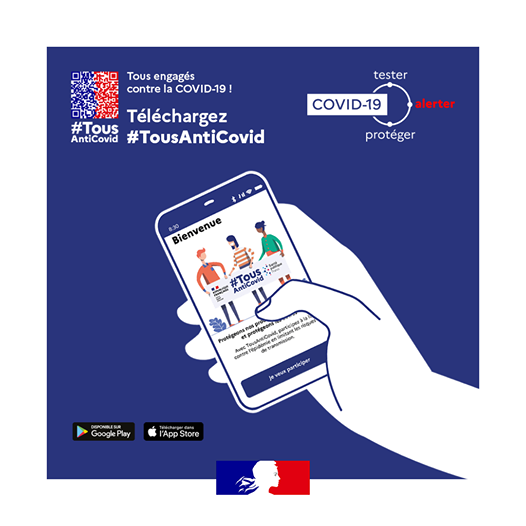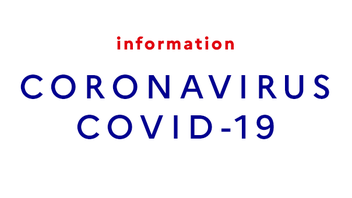
TousAntiCovid: a new application to fight the epidemic
The French Ministry of Health has just published an FAQ on the new TousAntiCovid application, the app designed to better inform people, and to join the fight against the epidemic.
La nouvelle application TousAntiCovid a pour principe de prévenir les personnes qui ont été à proximité d’une personne testée positive. Elle permet aussi d’en savoir plus sur l’évolution de l’épidémie et sur la conduite à tenir pour rester vigilant.
Une nouvelle application, plus facile d’utilisation et plus complète
Face à la nouvelle accélération de l’épidémie en France, le gouvernement a affiné sa stratégie de lutte contre le virus en renouvelant notamment les outils numériques. TousAntiCovid se présente ainsi comme une « version enrichie et interactive » de la première application StopCovid qui permettait d’être alerté et d’alerter en cas de proximité avec une personne testée positive. Cette alerte, précise le ministère de la santé, doit maintenant « permettre à l’utilisateur de se faire dépister prioritairement ».
Des principes simples et efficaces
TousAntiCovid repose sur des principes simples. Il s’agit essentiellement, à partir de son smartphone, de « prévenir, tout en garantissant l’anonymat, les personnes qui ont été à proximité d’une personne testée positive, afin que celles-ci puissent aller se faire tester et être prises en charge le plus tôt possible ». Dans le même temps, l’application permet aussi de rester informé sur l’évolution de l’épidémie et sur les conduites à tenir.
Des évolutions notables
La nouvelle application TousAntiCovid, qui sera régulièrement enrichie de nouveaux services, apporte ainsi de nombreuses évolutions. Outre une meilleure ergonomie, plusieurs fonctionnalités sont maintenant accessibles.
Parmi celles-ci :
-
une information sur la situation épidémiologique en France ;
-
la carte actualisée des centres de dépistages (DépistageCovid) ;
-
des conseils personnalisés (MesConseilsCovid) ;
-
l’accès facilité aux attestations dérogatoires de déplacement ;
-
la publication des chiffres l’utilisation de l’application.
Une application limitée et temporaire
Le ministère de la santé et le secrétariat d’Etat au numérique précisent également les principes technologiques de sécurité sur lesquels fonctionne le système. Ainsi, l’application « utilise la capacité à identifier les téléphones à proximité à partir des technologies Bluetooth et non les déplacements des personnes. Elle n’utilise à aucun moment la localisation des personnes, notamment par les données GPS des téléphones portables, à la différence du choix fait par d’autres pays ».
Le principe du caractère temporaire de l’application est aussi affiché : selon ses concepteurs, « elle n’aura plus lieu d’exister après la fin de l’épidémie ». Enfin, « chacun peut décider, à tout moment, de désinstaller l’application, entrainant la suppression de toutes les données enregistrées au bout de 14 jours ».
Related contents
Recommended News






















































